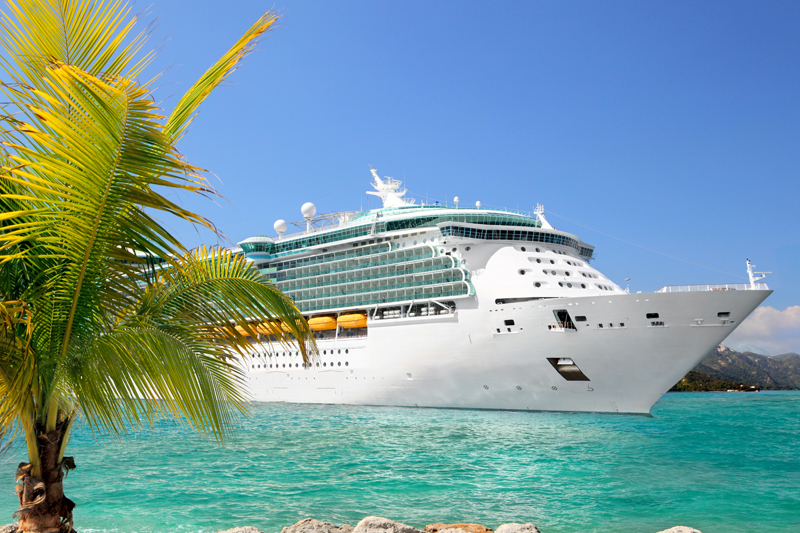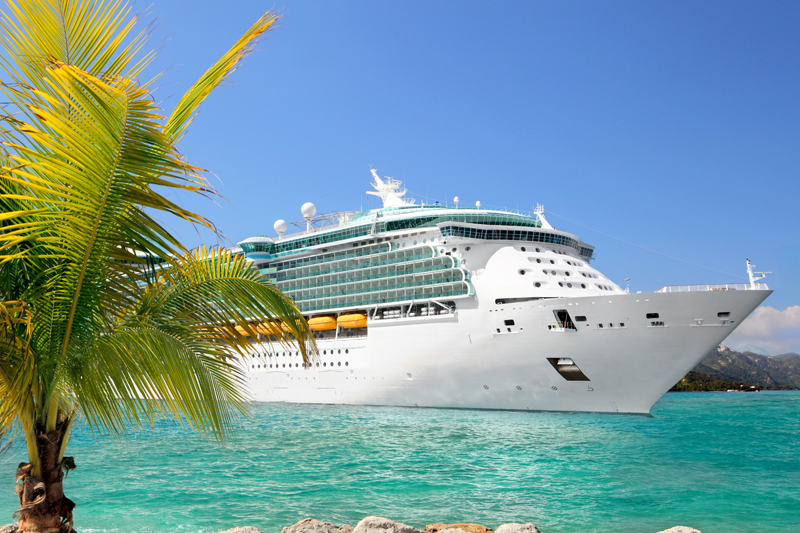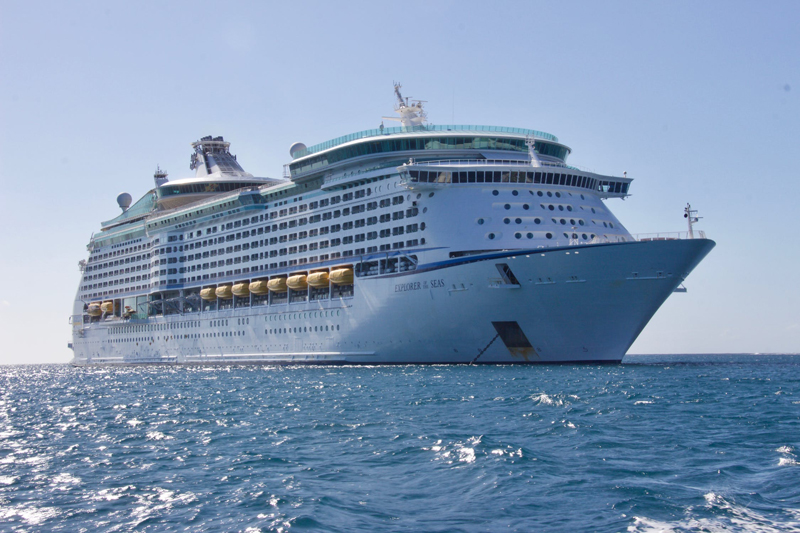Cruising During The Atlantic Hurricane Season

Cruising during hurricane season can offer great deals, although there are some risks. Although these tropical storms don’t impact most cruises taking place during this time, certain sailings are significantly affected. While there are benefits to taking a cruise to the Caribbean, Mexico, Bermuda or the Bahamas during the summer and fall, it is essential to be aware of the potential hazards as well.
Here are answers to a few of the most common questions about cruising during the Atlantic hurricane season.
When Is The Atlantic Hurricane Season?
Hurricane season in the Atlantic Ocean, the Caribbean and the Gulf of Mexico officially lasts from June 1 until November 30. The season is generally most active between mid-August and mid-October, although it became active much earlier this year. Hurricanes in the Caribbean can also impact sailings to the Bahamas, Bermuda and even cruises in Canada and New England.
When Is Hurricane Season In Mexico?
The Gulf of Mexico’s hurricane season is also officially June 1 through November 30. The activity level along Mexico’s Riviera Maya and the Western Caribbean has a slightly different time frame, with more hurricanes typically occurring from mid-September through early November. Hurricanes also impact Mexico’s western coast during a similar time period.
Are There Islands That Aren’t Affected By Hurricane Season?
The Southern Caribbean islands, including Aruba, Bonaire and Curacao, are outside the typical Caribbean hurricane track.
What’s The Upside Of Cruising During Hurricane Season?
Most cruises sailing during hurricane season do not encounter tropical storms, and there are certainly significant benefits for cruising during this time of year. The summer months are popular for family vacations, and it’s a prime getaway time for educators and others as well. Outstanding cruise deals on hurricane season voyages are available, particularly from late July through mid-October. For those who prefer more of an adults-only environment on their cruises, there are often fewer children aboard in the fall.
What Are Potential Negative Impacts During Hurricane Season?
While hurricanes and other significant weather disruptions do not occur often, it is essential to keep their possible impacts in mind when making your cruise plans. Here are seven potential vacation risks to consider when planning a hurricane season cruise.
1. Cruise Port Cancellations. One of the advantages of choosing a cruise instead of a land vacation during hurricane season is that ships can change their course. Instead of visiting ports being impacted by a storm, the cruise line might route the ship to another island. While this can be great for those simply wishing to enjoy any tropical escape, it can cause disappointment for guests who booked their cruise because of that specific port of call or itinerary. Cruise lines’ policies allow them to change ports of call if necessary, and guests are not entitled to compensation other than refunded port fees for any missed port. Sometimes credit is provided to guests as a goodwill gesture, but that is at the cruise line’s discretion.
2. Unscheduled Days At Sea. If stormy weather makes it impossible to access a port and an appropriate alternative cannot be found, cruise lines may substitute a day at sea. Since safety is the top priority, cruise ships will generally be routed to areas offering the calmest seas and the best guest experience. While days at sea can be enjoyable, they may not be ideal for guests seeking a port-intensive cruise.
3. Significant Itinerary Changes. When major hurricanes arise, it can sometimes be difficult for ships to safely access any area of the Caribbean, the Bahamas or Mexico’s Pacific Coast. As a result, cruise lines may significantly alter planned itineraries resulting in a completely different type of cruise. Instead of going south to the Bahamas or the Caribbean, ships leaving from New York or Baltimore might head north for a Canada & New England cruise. Such a dramatically changed cruise itinerary may not appeal to some guests. Again, cruise line policies allow them to change ports of call as needed. If the ship has yet to sail before the change is made, sometimes guests can cancel their cruise for a full refund. That decision is up to each cruise line.
4. Shorter Or Longer Cruises Than Expected. Unscheduled days at sea may occur if the ship’s homeport is closed due to a tropical storm, forcing the vessel to stay at sea until it’s safe to return to port. This can result in extra days being added to the cruise. Severe weather may force cruise lines to also cut subsequent sailings short as well. While some guests may celebrate their extended voyages, it may cause problems for others who have post-cruise travel plans or need to return home for work. Sometimes cruise lines offer compensation for itinerary changes caused by tropical storms.
5. Rough Seas. Vacationers who tend to get seasick should take care when traveling during hurricane season. Tropical storms can result in turbulent seas, even if the severe weather is hundreds of miles away. Cruise ships have stabilizers, so the effects of high seas can be less significant than in the past. In addition, cruise lines will try to reposition their ships to avoid bad weather. Rough seas may also impact shore excursion availability as well.
6. Cruise Cancellations. If a ship’s homeport is closed for multiple days due to a storm or the ship’s itinerary is significantly disrupted, the cruise may be canceled. While guests are entitled to a full refund if that happens, there still may be flight reservations and other issues to consider. This can be a challenge, particularly for those without travel insurance.
7. Flight Delays And Disruptions. Hurricanes and other types of severe weather can result in flight cancellations and delays. These flight disruptions can result in significant expenses and even wipe out an entire vacation. This is particularly true for cruises, where flight delays and cancellations can result in missing the ship.
What Are Some Tips For Cruising During Caribbean Hurricane Season?
If you’re considering cruising during hurricane season, here are some tips for traveling and staying prepared during this time of year.
1. Plan To Arrive At Least A Day In Advance. Tropical storms can wreak havoc with flight schedules, causing significant delays and cancellations. Driving conditions can also be more difficult. It’s wise to plan to arrive at your embarkation port a day or more before your cruise begins to allow extra time for possible delays. If you are flying to your destination, try to book early morning flights when the chances of thunderstorms and severe weather are less likely.
2. Use A Top-Notch Travel Agent. Working with a good travel advisor can be helpful for any cruise since they can help vacationers select the right cruise ship and stateroom. In a weather emergency, experienced travel agents are even more important. Travel advisors can keep their clients posted on itinerary changes and helping them reschedule flights if a storm disrupts airline schedules or their ship’s planned sailing dates.
3. Purchase Travel Insurance. It’s smart to purchase trip insurance for cruises during the Atlantic hurricane season. A good cruise insurance package protects against travel delays, travel interruption, and trip cancellation due to a hurricane. Make sure to research your policy carefully before purchasing it and understand what’s included and what’s not. Changes in cruise itineraries due to bad weather are not covered by travel insurance. Remember, travel insurance only covers unpredicted events. Once the weather forecasters have indicated that a hurricane is possible, it’s too late to purchase trip insurance for hurricane coverage.
4. Book Shore Excursions Carefully. Research shore excursion cancellation policies in detail. The cruise line and many excursion tour operators will provide full refunds if the ship does not reach the port. Smaller tour operators may have different refund policies, however, so confirm in writing before booking.
5. Monitor The Weather Closely. If you’ve planned a cruise during hurricane season, monitor the weather as your departure gets closer. The National Hurricane Center’s website provides detailed information. If you’re driving to your embarkation port, park your car well above the high-water mark in case of flooding.
6. Pack Seasickness Medications. While your ship's captain will work hard to deliver the best guest experience, sometimes rough seas may be present. Plan accordingly and bring along seasickness remedies just in case.
7. Be Prepared With Extra Items. If a tropical storm arises during hurricane season, it’s possible that your cruise may be unexpectedly extended. Bring extra medication and toiletries, as well as rain gear. Cruise ships generally do not stock items for young children. If you’re traveling with little ones, it’s wise to pack additional diapers and other essentials in case of delays.
8. Stay In Touch With Your Cruise Line And Airline. As your sailing date approaches, check your email regularly and monitor your cruise line’s website to be aware of any changes to your itinerary. Good communication is particularly important during hurricane season. Monitor your airline’s website as well.
Here are answers to a few of the most common questions about cruising during the Atlantic hurricane season.
When Is The Atlantic Hurricane Season?
Hurricane season in the Atlantic Ocean, the Caribbean and the Gulf of Mexico officially lasts from June 1 until November 30. The season is generally most active between mid-August and mid-October, although it became active much earlier this year. Hurricanes in the Caribbean can also impact sailings to the Bahamas, Bermuda and even cruises in Canada and New England.
When Is Hurricane Season In Mexico?
The Gulf of Mexico’s hurricane season is also officially June 1 through November 30. The activity level along Mexico’s Riviera Maya and the Western Caribbean has a slightly different time frame, with more hurricanes typically occurring from mid-September through early November. Hurricanes also impact Mexico’s western coast during a similar time period.
Are There Islands That Aren’t Affected By Hurricane Season?
The Southern Caribbean islands, including Aruba, Bonaire and Curacao, are outside the typical Caribbean hurricane track.
What’s The Upside Of Cruising During Hurricane Season?
Most cruises sailing during hurricane season do not encounter tropical storms, and there are certainly significant benefits for cruising during this time of year. The summer months are popular for family vacations, and it’s a prime getaway time for educators and others as well. Outstanding cruise deals on hurricane season voyages are available, particularly from late July through mid-October. For those who prefer more of an adults-only environment on their cruises, there are often fewer children aboard in the fall.
What Are Potential Negative Impacts During Hurricane Season?
While hurricanes and other significant weather disruptions do not occur often, it is essential to keep their possible impacts in mind when making your cruise plans. Here are seven potential vacation risks to consider when planning a hurricane season cruise.
1. Cruise Port Cancellations. One of the advantages of choosing a cruise instead of a land vacation during hurricane season is that ships can change their course. Instead of visiting ports being impacted by a storm, the cruise line might route the ship to another island. While this can be great for those simply wishing to enjoy any tropical escape, it can cause disappointment for guests who booked their cruise because of that specific port of call or itinerary. Cruise lines’ policies allow them to change ports of call if necessary, and guests are not entitled to compensation other than refunded port fees for any missed port. Sometimes credit is provided to guests as a goodwill gesture, but that is at the cruise line’s discretion.
2. Unscheduled Days At Sea. If stormy weather makes it impossible to access a port and an appropriate alternative cannot be found, cruise lines may substitute a day at sea. Since safety is the top priority, cruise ships will generally be routed to areas offering the calmest seas and the best guest experience. While days at sea can be enjoyable, they may not be ideal for guests seeking a port-intensive cruise.
3. Significant Itinerary Changes. When major hurricanes arise, it can sometimes be difficult for ships to safely access any area of the Caribbean, the Bahamas or Mexico’s Pacific Coast. As a result, cruise lines may significantly alter planned itineraries resulting in a completely different type of cruise. Instead of going south to the Bahamas or the Caribbean, ships leaving from New York or Baltimore might head north for a Canada & New England cruise. Such a dramatically changed cruise itinerary may not appeal to some guests. Again, cruise line policies allow them to change ports of call as needed. If the ship has yet to sail before the change is made, sometimes guests can cancel their cruise for a full refund. That decision is up to each cruise line.
4. Shorter Or Longer Cruises Than Expected. Unscheduled days at sea may occur if the ship’s homeport is closed due to a tropical storm, forcing the vessel to stay at sea until it’s safe to return to port. This can result in extra days being added to the cruise. Severe weather may force cruise lines to also cut subsequent sailings short as well. While some guests may celebrate their extended voyages, it may cause problems for others who have post-cruise travel plans or need to return home for work. Sometimes cruise lines offer compensation for itinerary changes caused by tropical storms.
5. Rough Seas. Vacationers who tend to get seasick should take care when traveling during hurricane season. Tropical storms can result in turbulent seas, even if the severe weather is hundreds of miles away. Cruise ships have stabilizers, so the effects of high seas can be less significant than in the past. In addition, cruise lines will try to reposition their ships to avoid bad weather. Rough seas may also impact shore excursion availability as well.
6. Cruise Cancellations. If a ship’s homeport is closed for multiple days due to a storm or the ship’s itinerary is significantly disrupted, the cruise may be canceled. While guests are entitled to a full refund if that happens, there still may be flight reservations and other issues to consider. This can be a challenge, particularly for those without travel insurance.
7. Flight Delays And Disruptions. Hurricanes and other types of severe weather can result in flight cancellations and delays. These flight disruptions can result in significant expenses and even wipe out an entire vacation. This is particularly true for cruises, where flight delays and cancellations can result in missing the ship.
What Are Some Tips For Cruising During Caribbean Hurricane Season?
If you’re considering cruising during hurricane season, here are some tips for traveling and staying prepared during this time of year.
1. Plan To Arrive At Least A Day In Advance. Tropical storms can wreak havoc with flight schedules, causing significant delays and cancellations. Driving conditions can also be more difficult. It’s wise to plan to arrive at your embarkation port a day or more before your cruise begins to allow extra time for possible delays. If you are flying to your destination, try to book early morning flights when the chances of thunderstorms and severe weather are less likely.
2. Use A Top-Notch Travel Agent. Working with a good travel advisor can be helpful for any cruise since they can help vacationers select the right cruise ship and stateroom. In a weather emergency, experienced travel agents are even more important. Travel advisors can keep their clients posted on itinerary changes and helping them reschedule flights if a storm disrupts airline schedules or their ship’s planned sailing dates.
3. Purchase Travel Insurance. It’s smart to purchase trip insurance for cruises during the Atlantic hurricane season. A good cruise insurance package protects against travel delays, travel interruption, and trip cancellation due to a hurricane. Make sure to research your policy carefully before purchasing it and understand what’s included and what’s not. Changes in cruise itineraries due to bad weather are not covered by travel insurance. Remember, travel insurance only covers unpredicted events. Once the weather forecasters have indicated that a hurricane is possible, it’s too late to purchase trip insurance for hurricane coverage.
4. Book Shore Excursions Carefully. Research shore excursion cancellation policies in detail. The cruise line and many excursion tour operators will provide full refunds if the ship does not reach the port. Smaller tour operators may have different refund policies, however, so confirm in writing before booking.
5. Monitor The Weather Closely. If you’ve planned a cruise during hurricane season, monitor the weather as your departure gets closer. The National Hurricane Center’s website provides detailed information. If you’re driving to your embarkation port, park your car well above the high-water mark in case of flooding.
6. Pack Seasickness Medications. While your ship's captain will work hard to deliver the best guest experience, sometimes rough seas may be present. Plan accordingly and bring along seasickness remedies just in case.
7. Be Prepared With Extra Items. If a tropical storm arises during hurricane season, it’s possible that your cruise may be unexpectedly extended. Bring extra medication and toiletries, as well as rain gear. Cruise ships generally do not stock items for young children. If you’re traveling with little ones, it’s wise to pack additional diapers and other essentials in case of delays.
8. Stay In Touch With Your Cruise Line And Airline. As your sailing date approaches, check your email regularly and monitor your cruise line’s website to be aware of any changes to your itinerary. Good communication is particularly important during hurricane season. Monitor your airline’s website as well.

Related Articles
Editor's Picks Articles
Top Ten Articles
Previous Features
Site Map
Content copyright © 2023 by Nancy Schretter. All rights reserved.
This content was written by Nancy Schretter. If you wish to use this content in any manner, you need written permission. Contact Nancy Schretter for details.






